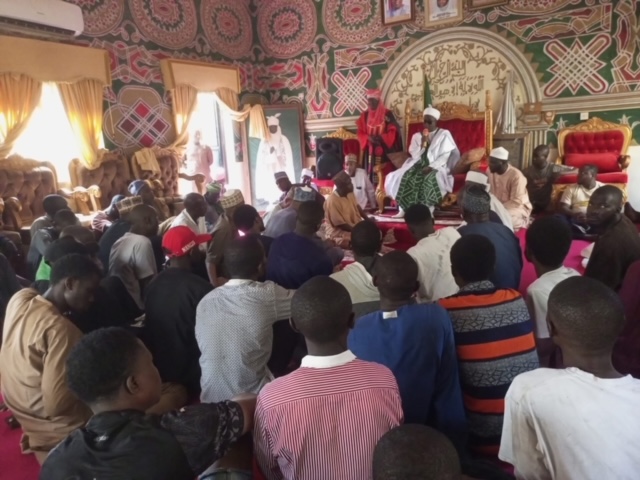
Daniel Otera
Calm has returned to Lapai, the university town in Niger State, following a violent protest that erupted on Sunday after the tragic killing of a 200-level Chemistry student at Ibrahim Badamasi Babangida University, Lapai (IBBUL).
The student, Abdulwahab Jafar, was reportedly murdered during a robbery at his off-campus residence, an incident that triggered widespread outrage among the student body and drew renewed attention to the persistent security challenges facing undergraduates across northern Nigeria.
Mr Jafar, believed to be the only child of his parents, was found dead after what has been described as a brutal attack by unidentified assailants.
His killing prompted spontaneous demonstrations. Students took to the streets, blocking major roads, damaging university property, and disrupting both commercial and academic activities. Several members of the press were also reportedly attacked during the chaos, reflecting the heightened volatility of the situation.
The protests were eventually quelled through the intervention of security agencies, the university management, and key officials from the Niger State Government, including the Commissioner for Local Government and Chieftaincy Affairs, Hamidu Jantabo, and the Commissioner for Tertiary Education, Abdullahi Mammagi. Meetings with student leaders and other stakeholders helped to de-escalate the situation. Increased security patrols were immediately deployed around the university’s main and Kobo campuses.

As part of its emergency response, the state government announced the deployment of over 200 vigilantes to bolster surveillance across student-dominated areas. Officials also unveiled plans to establish officially recognised security checkpoints and enforce stricter regulations on landlords of private student hostels, a move aimed at addressing the broader problem of unregulated accommodation that leaves the students vulnerable to criminal activity.
The university declared Tuesday and Wednesday as lecture-free days, giving the university community time to mourn the deceased and hold prayer sessions in his memory. Normal activities have since resumed across Lapai, with academic work continuing under an enhanced security presence.
Although the incident in Lapai appears isolated, it reflects a wider pattern of insecurity affecting university students across Nigeria particularly those residing off-campus. Many students in northern states live in fringe or peri-urban settlements where formal state security presence is minimal. These areas are often poorly lit, weakly policed, and lack structured housing regulations.
According to a 2024 report by SBM Intelligence, Nigeria recorded over 7,500 abductions in more than 1,100 incidents between July 2023 and June 2024. While not all incidents involved students, the report highlighted the disproportionate exposure of young people especially those in under-policed areas to violent crime.
Although official data from the National Bureau of Statistics on student accommodation is scarce, observations from community-level assessments suggest that most off-campus housing lacks minimum safety standards. In many cases, landlords are unvetted, residents are exposed to risk, and emergency response mechanisms are either weak or non-existent.
Mr Jafar’s murder therefore underscores a structural crisis: Nigeria’s student housing ecosystem, especially in public universities, is dangerously under-regulated. Thousands of students are pushed into unsafe lodgings due to a chronic shortage of affordable on-campus accommodation.

This problem is not unique to Lapai. Earlier this year, Obafemi Awolowo University in Osun State recorded over 30 cases of robbery and assault in a single fortnight most of them targeting students in off-campus residences. A similar trend has been reported at the University of Ibadan, where a severe hostel shortage has forced students into overcrowded and insecure housing.

Nigeria’s estimated 28 million-unit national housing deficit includes a wide gap in student-specific accommodation. A recent report by the Federal Mortgage Bank of Nigeria estimated that bridging this housing shortfall would require over ₦21 trillion, an amount that far exceeds current education and housing budgets.
While the deployment of local vigilantes may offer immediate relief in Lapai, concerns remain about long-term sustainability and oversight. In some states, such as Kwara, students have raised alarms about harassment and abuse of power by community security outfits.
In the aftermath of the protest, the university management issued a statement dismissing rumours that local youths from the host community were behind the killing. According to the statement, such claims are false, inflammatory, and capable of worsening tensions. The management assured students that both the town and campuses remain safe, and advised them to refrain from spreading unverified information.
Security patrols have been stationed at key locations around student lodges and access routes. Students have also been urged to report any suspicious activity and cooperate fully with law enforcement.
Beyond the immediate security response, the tragedy has reignited national conversations about the duty of care that universities and state governments owe to their students particularly those forced to live off-campus.
The death of Abdulwahab Jafar has become more than a local tragedy; it is a flashpoint in the broader debate about student safety in Nigerian universities.
